![]()
The military, which seized power in a coup in February 2021, has abolished 40 political parties, including Aung San Suu Kyi’s National League for Democracy (NLD).
The military imposed the law and began compiling voter lists in preparation for promised elections. Analysts say any vote held under the regime would be widely considered invalid.
The registration law imposed by the junta set various tough requirements for national parties. They included recruiting 100,000 members within 90 days of registration – far more than the previous requirement of 1,000 members. Parties must also open offices in at least half of all 330 townships within 180 days, contest at least half of all constituencies and hold funds of 100m kyat (£40,000).
The NLD, the country’s most popular party, won elections by a landslide in 2020, though the military refused to accept the results. The junta seized power in February 2021, detaining Aung San Suu Kyi and others, and alleging electoral fraud – a claim rejected by independent observers.
Aung San Suu Kyi has since been sentenced to a total of 33 years in prison.
The military has deployed brutal violence to try to suppress determined opposition from the public, and much of the country is engulfed in conflict as an armed resistance seeks to overthrow the generals. Military airstrikes are now an almost daily occurrence and more than 1.38 million people have been displaced by fighting since the coup, according to the UN.
Japan’s foreign ministry said in a statement that it was “seriously concerned that the exclusion of the NLD from the political process will make it even more difficult to improve the situation”. The Guardian reports,
“Japan strongly urges Myanmar to immediately release NLD officials, including Suu Kyi, and to show a path toward a peaceful resolution of the issue in a manner that includes all parties concerned.”
The UK also condemned the dissolution of the NLD and other parties, calling it an “assault on the rights and freedoms” of the Myanmar people.
“We condemn the military regime’s politically motivated actions and their use of increasingly brutal tactics to sow fear and repress opposition,” a UK Foreign Office spokesperson said.
The Australian government said it was concerned about the “further narrowing of political space in Myanmar” resulting from the imposition of the new political party registration law.
“The people of Myanmar continue to show their courage and commitment to a democratic country in the face of increasing repression and violence by the regime,” it added.
Sri Lanka continues to maintain close connections with the military regime.
Former President Maithripala Sirisena has cited a shared adherence to Theravada Buddhist philosophy as a guiding factor in the two countries' political alliance, whilst extremist and racist Buddhist monks in both countries have held longstanding close ties.
The UN High Commissioner of Human Rights Zeid Ra'ad Al Hussein called on member states of the Human Rights Council to refer Myanmar to the International Criminal Court.
The UN's Independent International Fact-Finding Mission on Myanmar was set up in March 2017 and headed by Marzuki Darusman who also co-authored the 2011 report produced by a panel of experts on mass atrocities in Sri Lanka. “The world’s attention may have moved away from Myanmar since [the] coup, but civilians continue to pay a high price. The military’s ongoing assault on civilians in eastern Myanmar has been widespread and systematic, likely amounting to crimes against humanity,” said Rawya Rageh, Senior Crisis Adviser at Amnesty International.
In April 2021, Sri Lanka was also met with widespread protests and condemnation as a result of its invitation to Myanmar's military junta to the 5th Bay of Bengal Initiative of the Multi-Sectoral Technical and Economic Co-operation (BIMSTEC) summit, that was being held on the island.
Read more at the Guardian

